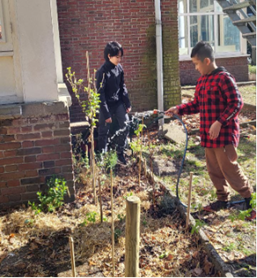Natural sciences and social sciences learning in school garden, Indonesian School of the Haque, Netherlands
DOI:
https://doi.org/10.22219/jcse.v4i3.27793Keywords:
school gardens, Indonesia School of the Hague, Natural sciences , Social sciencesAbstract
School gardens can be used as a source of student learning for various subjects in an integrated manner to improve student’ academic, personal, awareness, and social abilities. By implementing gardening activities students are trained to design, build and develop agricultural hustles at school through cultivating and harvesting the plants that may be consumed and added economic value. The service activity aims to utilize the school garden as a medium for learning natural science and social Science at the Indonesian school of the Hague. Methods of implementing activities consist of preparing materials tools, preparing seeds, clearing land, planting, caring for plants, observing the students’ behavior toward school gardens, and evaluating students’ understanding of school subject matter based on learning resources in the school garden. Based on students’ responses in answering questions related to science material and social science impacts, it shows that both science and social science learning activities in school gardens may assist in an in-depth understanding of the concept of agriculture skills and behaviors of the students.
Downloads
References
Alexander GK, Grannum DR (2022). School garden benefits: Health promotion and environmental conservation. NASN School Nurse.37(2):79-82. https://doi:10.1177/1942602X211058783
California School Garden Network (2010). Gardens for learning: Creating and sustaining your school garden. California: California School Garden Network.
Chan, C. L., Tan, P. Y., & Gong, Y. Y (2022). Evaluating the impacts of school garden-based programmes on diet and nutrition-related knowledge, attitudes and practices among the school children: a systematic review. BMC Public Health, 22(1). https://doi.org/10.1186/s12889-022-13587-x
Christian MS, Evans CE, Nykjaer C, Hancock N, Cade JE (2014). Evaluation of the impact of a school gardening intervention on children’s fruit and vegetable intake: a randomised controlled trial. Int J Behav Nutr Phys Act. 11(1):1–15. https://doi.org/10.1186/s12966-014-0099-7
Dettweiler, U.; Becker, C.; Auestad, B.H.; Simon, P.; Kirsch, P (2017). Stress in school. Some empirical hints on the circadian cortisol rhythm of children in outdoor and indoor classes. Int. J. Environ. Res. Public Health , 14, 475. https://doi.org/ 10.3390/ijerph14050475
Emily A. Holmes, Mary F. Campbell, Wesley James & Karen Matthews (2021). Sow, grow, know, and show: The Impact of school gardens on student self-perception in the Mississippi Delta, Ecology of Food and Nutrition, 60:2, 140-162.
https://doi.org/10.1080/03670244.2020.1807343
Food and Agriculture Organization (2004). School gardens concept note improving child nutrition and education through the promotion of school garden programmes Food and Agriculture Organization of the United Nations (FAO).
Food and Agriculture Organization (2006). School gardening a horticulture and nutrition education tool. Rome,Italy.
Gardner, Grace, Wendy Burton, Maddie Sinclair, and Maria Bryant (2023). "Interventions to strengthen environmental sustainability of school food systems: Narrative scoping review" International Journal of Environmental Research and Public Health 20, no. 11: 5916. https://doi.org/10.3390/ijerph20115916
Kammar, M., Biradar, A.P., Angadi, S.C., Vidyavathi, G.Y (2017). Impact of school nutrition garden on the nutrient intake of children. Asian Journal of Agricultural Extension, Economics & Sociology. 18(2): 1-8. DOI:10.9734/AJAEES/2017/34018
Kuo M, Barnes M and Jordan C (2019). Do experiences with nature promote learning? converging evidence of a cause-and-effect relationship. Front. Psychol. 10:305. https://doi.org/10.3389/fpsyg.2019.00305
Kuntariningsih, Apri. (2018). Impact analysis of school garden program to overcome malnutrition of children. Jurnal Kesehatan Komunitas, vol. 4, no. 1, 2018, pp. 26-32, doi:10.25311/keskom.Vol4.Iss1.223.
Lapau, Buchari. (2015). Perlu mendirikan laboratorium kesehatan masyarakat dalam rangka sustainable development goals for healthy future. Jurnal KESEHATAN KOMUNITAS,3(1):1-3, doi:10.25311/jkk.Vol3.Iss1.150.
Latifah E., Mariono L, Andri KB (2014). Pengenalan model kebun sayur sekolah untuk peningkatan konsumsi bagi para siswa di Kediri-Jawa Timur.Jurnal Agriekonomika, 3(1):34-44. https://doi.org/10.21107/agriekonomika.v3i1.438
Lohr AM, Bell ML, Coulter K, (2023). The association between duration of school garden exposure and self-reported learning and school connectedness. Health Education & Behavior. 2023;50(5):637-646. doi:10.1177/10901981221084266
Mann J, Gray T, Truong S, Brymer E, Passy R, Ho S, Sahlberg P, Ward K, Bentsen P, Curry C and Cowper R (2022). Getting out of the classroom and into nature: A systematic review of nature-specific outdoor learning on school children’s learning and development. Front. Public Health 10:877058. https:// doi.org/10.3389/fpubh.2022.877058
Mason, L.; Zagni, B.; Bacchin, F.; Frison, C.; Scrimin, S (2022). Children’s attentional processes in outdoor and indoor environments: the role of physiological self-regulation. Int. J. Environ. Res. PublicHealth,19,13141. https://doi.org/10.3390/ijerph192013141
Nurwidodo, Hindun, I., Mahmudati, N., & Iswanto. (2022). Pemanfaatan kebun sekolah sebagai sumber belajar untuk meningkatkan aktivitas dan pemahaman siswa pada materi biologi. Jurnal SOLMA, 11(1), 79–91. https://doi.org/10.22236/solma.v11i1.8268
Pollin S and Retzlaff-Fürst C (2021). The school garden: A SOCIAL AND EMOTIONAL PLACE. Front. Psychol. 12:567720. doi: 10.3389/fpsyg.2021.567720
Rabiner, D. L., Godwin, J., & Dodge, K. A. (2016). Predicting academic achievement and attainment: The contribution of early academic skills, attention difficulties, and social competence. School Psychology Review, 45(2), 250–267. https://doi.org/10.17105/SPR45-2.250-267
Rutter, M. (2000). School effects on pupil progress: research findings and policy implications,in Psychology of Education: Major Themes, Vol. 1, eds P. K. Smith and A. D. Pellegrini (London: Falmer Press), 3–150. https://doi.org/10.2307/1129857
Sutrisno & Harjono, H.S. (2005). Pengenalan lingkungan alam sekitar sebagai sumber belajar siswa. Jakarta: Direktorat Pembinaan Pendidikan Tenaga Kependidikan dan Ketenagaan Perguruan Tinggi
Schultz C, Rosen AE (2022). School Gardens’ Impact on Students’ Health Outcomes in Low-Income Midwest Schools. The Journal of School Nursing. 38(5):486-493. doi:10.1177/10598405221080970
Story M, Kaphingst KM, Robinson-O’Brien R, Glanz K (2008). Creating healthy food and eating environments: policy and environmental approaches. Annu Rev Public Health. 29:253–72. https://www.annualreviews.org/doi/pdf/10.1146/annurev.publhealth.29.020907.090926
Windarto, R. D., Perkasa, R. A., R, A. P. N., K, L. A. B., Hapsari, R. M., & Antriyandarti, E. (2020). edukasi pertanian pada siswa dengan kebun sekolah aktif Di SD Muhammadiyah 3 Surakarta. Jurnal Agribest, 4(2), 75–80. https://doi.org/10.32528/agribest.v4i2.3617
Wiradnyani, L. A. A., Februhartatnty, J., Oka, A. A. S. I., Shinta, D., Sudibya, A. R. P., & Agustin, C. A. (2018). Kumpulan rencana ajar untuk guru sekolah dasar dan menengah: Edukasi gizi berbasis kebun sekolah (1st ed., Vol. 1). www.seameo-recfon.org

Downloads
Published
How to Cite
Issue
Section
License
Copyright (c) 2023 S. Syamsia, Herman Tahir, Ilman Abdurofi, R. Rahmi, Asriyanti Syarif

This work is licensed under a Creative Commons Attribution-ShareAlike 4.0 International License.












